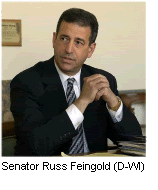Feingold Investigating Congress's Power To End War
 Senator Russ Feingold (D-WI) has for some time been a strong voice opposing the war in Iraq -- he voted against the original resolution authorizing the use of force in 2002 -- and has been even louder in speaking out against the Bush-McCain Doctrine of truly making Iraq a war without end. Starting today, he'll take it a step further when he chairs a Senate Judiciary Committee hearing entitled “Exercising Congress’s Constitutional Power to End a War.”
Senator Russ Feingold (D-WI) has for some time been a strong voice opposing the war in Iraq -- he voted against the original resolution authorizing the use of force in 2002 -- and has been even louder in speaking out against the Bush-McCain Doctrine of truly making Iraq a war without end. Starting today, he'll take it a step further when he chairs a Senate Judiciary Committee hearing entitled “Exercising Congress’s Constitutional Power to End a War.”Feingold, Chairman of the Senate Judiciary Committee’s subcommittee on the Constitution, called on Congress as soon as the new session began to use its power of the purse to redeploy troops safely from Iraq so that we can refocus on the global terrorist networks that truly threaten our national security.
“Congress holds the power of the purse and if the President continues to advance his failed Iraq policy, we have the responsibility to use that power to safely redeploy our troops from Iraq,” Feingold said. “This hearing will help inform my colleagues and the public about Congress’s power to end a war and how that power has been used in the past."
The Judiciary Committee hearing is intended to help clarify exactly what Congressional options exist to help Senate Democrats halt George W. Bush's ill-advised escalation of the Iraq war and will include testimony from Prof. Walter Dellinger, Duke University School of Law -- and former Solicitor General of the United States -- Prof. David Barron, Harvard Law School and Prof. Robert Turner of the University of Virginia Law School.
Feingold has also announced that he will soon introduce legislation to use Congress's control over federal spending to end what he calls "…one of the greatest mistakes in the history of our nation’s foreign policy” and propose a strict time by which funding for the war will be cut off.
"Americans are not looking to Congress to pass symbolic measures, they are looking to us to stop the President's failed Iraq policy," wrote Feingold in a Huffington Post column on Monday. "That is why we must finally break this taboo that somehow Congress can't talk about using its power of the purse to end the war in Iraq. The Constitution makes Congress a co-equal branch of government. It's time we start acting like it."
"We have a moral responsibility, as well as a responsibility to the brave troops whose lives are on the line, to end the war. We can and must force the President to safely redeploy our troops so that we can get back to focusing on those who attacked us on 9/11."
Feingold also explains that, while he's aware that some will wrongly accuse him of not supporting the troops, he believes that putting Bush on a short leash in terms of war funding, will force the White House to begin a withdrawal of American troops from the Iraq quagmire.
Here's more from Feingold's Huffington Post column:
"I want everyone to be clear on exactly what my proposal will do. The first and most important thing to know is that my plan does not cut funding for the troops. Our troops will continue to receive the salaries, equipment, training and protection they need. What I am proposing is ending funds for the continued deployment of U.S. forces in Iraq six months after the enactment of the bill. This will require the President to safely redeploy troops from Iraq by that date.Feingold also writes that, despite the fact that there's precedent in Congress for using funding power in this way, he fully expects the White House to "resort to their usual intimidation tactics to try to paint this proposal as not supporting the troops" and that he would instead like Bush to answer for his latest non-plan.
"My bill does provide exceptions to allow for specific types of military missions within Iraq past the six-month deadline, such as targeted counter-terrorism efforts, the protection of American personnel and infrastructure, and a limited number of troops needed to help train Iraqi security forces. But these will be limited forces used for specific missions.
"Suggestions that our troops will be left in the lurch couldn't be further from the truth. My proposal would bring the troops out of harm's way."
"I'd like to hear from the President exactly how sending 21,500 more U.S. troops into a civil war supports them," writes Feingold. "We must not let this administration continue to intimidate like it did in the lead-up to war."
"The catastrophe in Iraq is not the fault of our brave men and women in uniform, but rather the failed policies of this administration. Our troops and our national security should no longer be the ones to suffer for this Administration's terrible mistake."

















<< Home